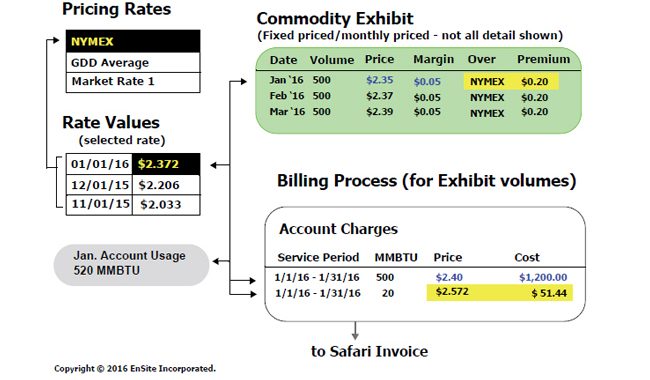For energy marketers, so much depends on price—and it had better be the right price. Fortunately, users of EnSite Safari Suite® have a wide array of standard options and built-in safeguards enabling precise control over retail energy pricing rates for commodity, basis, demand, or virtually any other product offering that requires unit pricing.
At the commodity exhibit pricing product, Safari users can employ a ‘base’ fixed unit price or indexed price offering. Indexed offerings (and settlement pricing for all offerings) utilize Safari Pricing Rates. For both of these base pricing options, users can employ add-on pricing components for margin, basis, fuel (line loss), premiums for settlement pricing, and more.
In support of indexed price offerings, Safari provides a dedicated Retail Energy Pricing Rate Maintenance system that lets users exercise precise control over the rate that is ultimately applied to the product/unit.
- Safari’s Retail Energy Pricing Rates are managed by frequency, with Safari supporting monthly, daily, and hourly rates.
- For each Frequency type, users may input rates that reflect published rate values (such as NYMEX LDS for monthly application or Gas Daily Daily rates for daily pricing) or custom/proprietary rates developed by the Marketer may be managed.
- For periodic rate values, Safari provides users with a “Pricing Precision” system setting that governs the decimal values permitted for rates to be used in calculating a dollar-amount invoiced cost of goods. Users may choose to employ 0 – 6 decimals for Safari Pricing Rates. (Safari will automatically round rates input with more decimal values than are supported for the system setting.)
- Rates are managed for Unit of Measure (UOM), such that the Pricing Rate value reflects the price for a distinct unit quantity. A Pricing Rate for the MMBTU UOM, for example, will price MMBTU units during invoicing. However, if the customer’s contracted units are in a different UOM, Safari provides automated rate conversion at invoice time. Thus a $3.00 rate for MMBTU can, for example, price Therms at a converted rate of $0.30 per unit. Conversion factors are user-maintained by Utility for precise control over this process.
- Safari offers the flexibility of fixed- or index-priced contracted commodity units with settlement for over/under units via indexed pricing (with additional available adders for each). “Trigger” pricing products support contracted commodity or basis price at a “floating” (index) price with the ability to trigger fixed commodity or basis price for partial (or all) contract units. Commodity or basis for non-triggered units is priced by the assigned “floating” index at invoice time, when the published index value will have settled.
- Rate values may be manually input, or Safari users may import rate values from spreadsheet source files using a variety of automated import protocols. Rate imports are standard Safari offerings provided to all users.
- For a defined Pricing Rate, users may maintain “actual” rate values and forward “estimated” values. Estimated values are used by Safari’s special Prepay invoicing system, with the priced units subject to automated “true up” to actual published rate values on subsequent invoices.
- Safari supports composite rate and WACOG rate maintenance. Composite Rates provide the user with the means to build a custom Pricing Rate that is an additive or averaged composite of two or more standard Safari Pricing Rates. WACOG rates are based on prices and volumes of supply packages tracked via Safari Supply Management.
- For meter reads spanning multiple months, Safari Pricing Rates are automatically prorated to an invoiced price value representing the weighted average for the rate over the read period. For example, a meter read for 1/14/16 – 2/13/16 would be priced by a weighted blend of the monthly rate’s January and February values.
In addition to retail energy pricing rates, Safari supports Utility-specific rates and Pipeline-specific rates for factoring BTU, Line Loss/Shrinkage, MDQs, and more.

